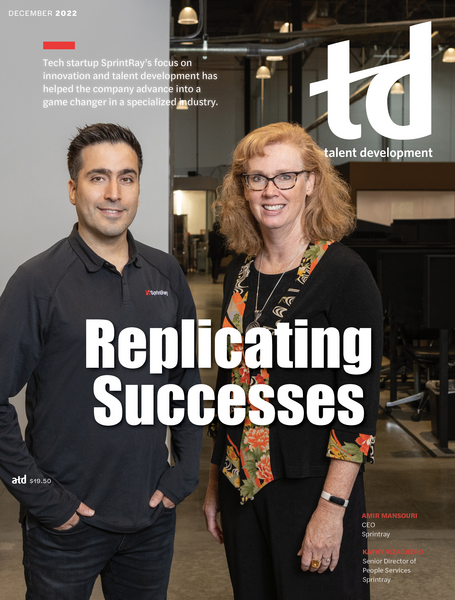TD Magazine Article
Member Benefit
Invest Long Term in Workers’ Mental Health
Content
Employees want to feel safe and supported.
Employees want to feel safe and supported.
Thu Dec 01 2022

Content
It's no secret that the past few years have been hard for everyone. With that has come an increased focus on mental health in the workplace. Speaking to more than 1,700 workers, managers, executives, and HR leaders, Modern Health and Forrester Consulting found a gap in how employees and employers view mental health.
It's no secret that the past few years have been hard for everyone. With that has come an increased focus on mental health in the workplace. Speaking to more than 1,700 workers, managers, executives, and HR leaders, Modern Health and Forrester Consulting found a gap in how employees and employers view mental health.
Content
"We're seeing a bigger need for support as more people speak out about their mental health challenges, but despite this progress, people around the world are still struggling to access care that meets their needs," says Alyson Watson, Modern Health's founder and CEO.
"We're seeing a bigger need for support as more people speak out about their mental health challenges, but despite this progress, people around the world are still struggling to access care that meets their needs," says Alyson Watson, Modern Health's founder and CEO.
Content
While employers and workers see the benefits of prioritizing mental health in the workplace, only 54 percent of employees say they have flexibility in their workday to address mental health needs. Three-quarters want their employers to care about their mental health, but only half believe their employer does. And while 85 percent of employers believe they actively listen to staff's needs, only 51 percent of workers agree.
While employers and workers see the benefits of prioritizing mental health in the workplace, only 54 percent of employees say they have flexibility in their workday to address mental health needs. Three-quarters want their employers to care about their mental health, but only half believe their employer does. And while 85 percent of employers believe they actively listen to staff's needs, only 51 percent of workers agree.
Content
"We are at a critical inflection point where organizations need to shift from the mindset of providing mental health support as a crisis response to it being an integrated and strategic part of the employee experience," Watson says. "Done right, the end result means both the companies and the human beings who make them run are more connected and engaged."
"We are at a critical inflection point where organizations need to shift from the mindset of providing mental health support as a crisis response to it being an integrated and strategic part of the employee experience," Watson says. "Done right, the end result means both the companies and the human beings who make them run are more connected and engaged."
Content
The report suggests companies create an environment that destigmatizes taking advantage of mental health benefits. As it stands, only half of employees would feel safe if their mental health status were revealed.
The report suggests companies create an environment that destigmatizes taking advantage of mental health benefits. As it stands, only half of employees would feel safe if their mental health status were revealed.
Content
Another issue comes with how employers view the cost of mental health benefits. Most employers worry that focusing on mental health could cause employees to work fewer hours to focus on themselves, thus hurting the organization's return on investment. However, as the report calls out, "The negative impact of an unsupported workforce on productivity, retention, creativity, engagement, performance, and absenteeism can be greater than the investment in employee mental health."
Another issue comes with how employers view the cost of mental health benefits. Most employers worry that focusing on mental health could cause employees to work fewer hours to focus on themselves, thus hurting the organization's return on investment. However, as the report calls out, "The negative impact of an unsupported workforce on productivity, retention, creativity, engagement, performance, and absenteeism can be greater than the investment in employee mental health."

